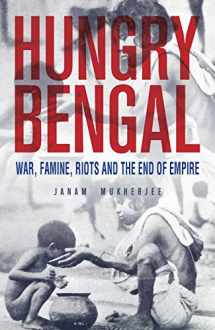
Hungry Bengal : War Famine Riots and the End of Empire
ISBN-13:
9789351775829
ISBN-10:
9351775828
Edition:
2015
Author:
Janam Mukherjee
Publication date:
2015
Publisher:
Harper Collins Publishers
Format:
Paperback
344 pages
FREE US shipping
Book details
ISBN-13:
9789351775829
ISBN-10:
9351775828
Edition:
2015
Author:
Janam Mukherjee
Publication date:
2015
Publisher:
Harper Collins Publishers
Format:
Paperback
344 pages
Summary
Hungry Bengal : War Famine Riots and the End of Empire (ISBN-13: 9789351775829 and ISBN-10: 9351775828), written by authors
Janam Mukherjee, was published by Harper Collins Publishers in 2015.
With an overall rating of 3.9 stars, it's a notable title among other
books. You can easily purchase or rent Hungry Bengal : War Famine Riots and the End of Empire (Paperback) from BooksRun,
along with many other new and used
books
and textbooks.
And, if you're looking to sell your copy, our current buyback offer is $2.01.
Description
Language: EnglishPages: 345About the BookThe years leading up to the independence and accompanying partition of India mark a tumultuous period in the history of Bengal. Representing both a major front in the Indian Struggle against colonial rule, as well as crucial Allied outpost in the British/American war against Japan, Bengal stood at the crossroads of complex and contentious structural forces-both domestic and international-which, taken together, defined an era of political uncertainty, social turmoil and collective violence. While for the British the overarching priority was to save the empire from imminent collapse at any cost, for the majority of the Indian population the 1940s were years of acute scarcity, violent dislocation and enduring calamity. In particular there are three major crises that shaped the social, economic and political context of pre-partition Bengal: the Second World War, the Bengal famine of 1943, and the Calcutta riots of 1946. Hungry Bengal examines these intricately interconnected events, foregrounding the political economy of war and famine in order to analyse the complex nexus of hunger, war and civil violence in colonial at the twilight of British rule. IntroductionFraming FamineThere will be no pictures of emaciated mothers with child in this book on famine. I will not be looking to elicit pity, or to evoke a sense of charity. Even in the search for empathy, the existential bridges that would be necessary to cross are impossibly broad, ultimately impassible. There are no such bridges. Famine preys on the poorest of the poor, the weakest of the weak, those whose very lives and life-stories are erased by marginality and neglect. Startling and/or demise, however moving, convey very little about


We would LOVE it if you could help us and other readers by reviewing the book
Book review

Congratulations! We have received your book review.
{user}
{createdAt}
by {truncated_author}


